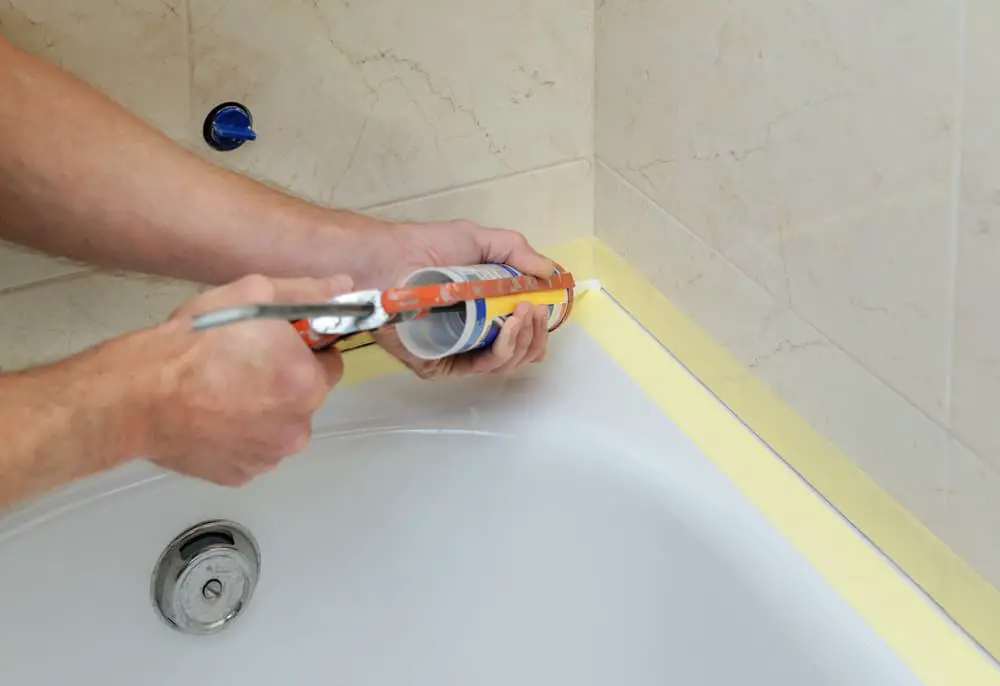Water is the biggest villain to a home’s structural integrity, and bathrooms happen to be the main wet areas in any house.
It is no surprise that bathrooms require remodeling more often than any other room in the house. Even a small leak from the edge of the bathtub can be very disastrous.
Certainly, any lasting bathroom remodel project includes waterproofing.
See Also: Can You Replace A Bathtub In A Mobile Home?
But Do You Need To Waterproof Underneath The Bathtub?
The simple answer is YES. With a lot of water flowing through your bathroom every day, nothing is more important than an efficient, complete moisture protection system. When it comes to the bathtub surround, it is vitally important to waterproof underneath the fixture and ensure proper waterproofing goes at least as high as the showerhead. This is crucial because, unlike what some people think, tiles are not waterproof.
Whether you own a manufactured home or a conventional house, your bathroom surround needs waterproofing.
This post will cover more on waterproofing under the tub and tips for waterproofing your bathrooms.
What Is Waterproofing?
At its core, waterproofing means protecting a surface from water damage, usually by making it cohesive.
The waterproof cement is a powder-like product that, when mixed with construction cement, creates a membrane that prevents water from seeping in.
For homeowners updating or renovating their bathrooms, waterproofing is best left in the hand of professionals. The process is risky and requires the right expertise.
Four Reasons Why Bathtub Waterproofing Is A Good Idea
Even for all its life-giving benefits, water can prove to be highly destructive.
This is especially true if you live in a manufactured home, which is usually made using porous material.
Your bathroom being a place where water trade is conducted every day, it is imperative to waterproof it. Even small infiltration is enough to leave you homeless when not addressed.
If you have ever experienced the horror of water dripping through the ceiling or dealt with damp walls, you know how catastrophic water damage can be.
The vinyl or tile finishing of your bathroom might not provide the protection you need.
Here are reasons why you should waterproof underneath your bathtub and the entire bathroom.
1. Stop Leaks
From wall joints to tile joints and plumbing pipes to shower splash zone areas, bathrooms have more weak areas that can easily turn to be points of leakages.
Water can seep through these points and find its way into the floor of your house, which can wreak havoc on your home’s structural integrity.
If unaddressed, wetness can reach electric circuits, creating more dangerous situations. Waterproofing underneath the floor and wall can prevent this.
2. Prevents Mold And Mildew Growth
If you are asthmatic or allergic, mold in your bathroom can aggravate your condition.
Waterproofing your bathroom keeps moisture from penetrating the walls, consequently preventing mold and mildew from thriving.
3. Maintaining Aesthetics
Considering how water damage can be catastrophic, waterproofing your bathroom is an easy way to preserve the structural integrity of your home.
Because it stops the spread of water leakage to walls, waterproofing also preserves aesthetics.
4. Costly Repairs Less Likely
Waterproofing your bathroom means minimal water damage.
This can ultimately save you from costly repairs and maintenance services.
Five Bathroom Waterproofing Tips
Waterproofing your bathroom can make the difference between a home that stays in pristine condition and one that requires frequent repairs.
If you are remodeling your home or planning to update your bathroom, here are tips to help you succeed with waterproofing.
1. Use Waterproof Building Materials
Organic materials are an excellent choice for building manufactured homes, but not the room that gets wet daily.
For your bathroom, you need materials that are not affected by moisture.
If you have a site-built home, consider stones, ceramic, and porcelain. The idea is to avoid anything that can rot.
2. Let A Professional Handle The Plumbing
While most homeowners are embracing DIY, it is best to leave your plumbing to experts.
Professional plumbers not only do the installation properly but also ensure code compliance.
3. Use Tile As Wall Surface
While tiles are not waterproof altogether, they can offer a degree of moisture protection as long as the joints are impervious.
4. Seal All Cracks And Holes
Even with a waterproof floor and ditra installed, you don’t want to take chances.
Use a bathroom-grade caulk to seal all cracks on the floor and walls to minimize the chances of water seeping in.
5. Pay Attention To The Baseboard System
The joint where the walls meet the bathroom floor can be a point of leakage.
Seal it with watertight bathroom-grade caulk.
Consider an inorganic material for the baseboard moldings.
Of course, this joint won’t cause serious concern if you use tiles on the walls.
For homeowners considering painting, use glossier paint.
Although paint is not necessarily waterproof, the smooth surface will help ward off the inevitable splashes.
After the remodel, regular maintenance practices like sealing cracks as they occur and mopping spilled water can go a long way to keeping your bathroom in good condition.
Conclusion
Although waterproofing underneath the bathtub is not generally done, it is a good idea.
Waterproofing underneath your bathtub, the entire floor, and the bathroom walls prevent moisture from seeping in, which can result in the growth of mold and mildew.
For homeowners contemplating the idea of waterproofing underneath bathtubs, leave the job to professionals.
Sources
https://www.drfixit.co.in/resources/blog/renovation/why-should-you-go-for-bathroom-waterproofing
https://www.thespruce.com/tips-for-waterproofing-your-bathroom-4800730

